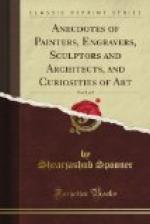Giordano, Luca—his Wonderful
Precocity, ii, 224;
his Enthusiasm, ii, 225;
Origin of his Nickname of
Luca-fa Presto, ii, 226;
his Skill in copying and Imitating,
ii, 226;
his Success at Naples, ii,
227;
Giordano, the Viceroy, and
the Duke of Diano, ii, 228;
his Invitation to Florence—Giordano
and Carlo Dolci, ii, 229;
his Invitation to the Court
of Spain, ii, 230;
his Flattering Reception,
ii, 230;
his Works in Spain, ii, 231;
in the Escurial, ii, 232;
his Habits, iii 233;
his first Picture at Madrid,
ii, 233;
a great Favorite at Court,
ii, 234;
Coello’s Challenge,
ii, 234;
Anecdotes, ii, 234;
Painting with his Fingers,
ii, 235;
Rich Presents he Received,
ii, 236;
his Return to Naples, ii,
236;
his Reception at Genoa, Florence,
Rome and Naples, ii, 237;
his Personal Appearance and
Character, ii, 237;
his Popularity, Love of Gain,
and “Three Sorts of Pencils,” ii, 238;
his Riches, ii, 238;
his Wonderful Facility of
Hand, ii, 239;
his Fame and Reputation, ii,
240;
his Genius and merits, ii,
241;
his Tricks for Notoriety,
his False Style and its Injurious Effects
on Art at the Time, ii, 241;
Remarkable Instance of his
Rapidity of Execution in his altar-piece
of St. Francis Xavier, ii,
242.
Giotto—Sketch of his Life,
ii, 257;
his Early Passion for Art,
ii, 257;
his Works, ii, 258;
as an Architect, ii, 259;
his St. Francis Stigmata,
ii, 259;
his Invitation to Rome, ii,
260;
“Round as Giotto’s
O,” ii, 261;
Story of his Living Model,
ii, 262;
Giotto and the King of Naples,
ii, 264;
his Bon Mots, ii, 265;
Giotto and Dante, ii, 266;
Death of Giotto ii 266.
Giottino, ii, 286.
Gladiator, Statue of the Dying, i, 144.
Gladiator, Statue of the Fighting, ii, 187.
Glass, Ancient, ii, 57;
Ancient Pictures of, ii, 58.
Golden Age of Art in Greece, i, 11, and ii, 154.
Golden Age of Art in Rome, ii, 152.
Golden Age of Art in Italy, ii, 149.
Goldsmith, Dr., and Reynolds, i, 199;
his “Deserted Village,”
i, 200;
his Retaliation, i, 200.
Gomez, the Slave of Murillo, iii, 195.
Grecian Art derived from the Egyptians, iii, 1.
Greenough, Horatio—his Chanting
Cherubs, i, 67;
Commission for his Statue
of Washington for the Capitol, i, 68;
his Modesty, i, 69;
his account of the Miraculous
Picture of the Virgin at
Florence, iii, 211.
Griffier, John—his Perilous Adventure, iii, 245.
Group of Niobe and her Children, ii, 185.
Group of Laocooen and his Sons, ii, 187.
Guercino—his Power of Relief, ii, 140.




